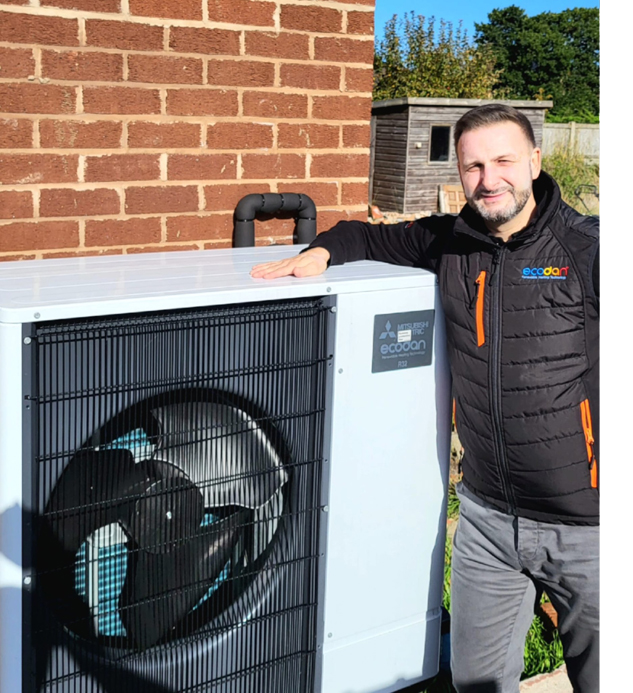Decarbonising the built environment is one of the biggest focuses in the UK today, in order to reach the ambitious goal of net-zero carbon emissions by 2050. Heating and hot water are big emitters of carbon, so changing the way we heat homes is vital to achieving this – and housing associations embracing low-carbon heating play an important part.
For social housing, keeping tenants warm and comfortable while ensuring energy costs stay low is critical. As we head into the colder months, it’s important that housing associations are supported to be able to move towards technology like heat pumps, which can provide heat and warm water to multiple homes or apartments, while being efficient enough to keep both energy use and costs to a minimum.
 Achieving sustainability goals through funding
Achieving sustainability goals through funding
All housing associations and social housing organisations are looking to decarbonise the homes they own, and have objectives through the Clean Growth Strategy to achieve an EPC rating of C or above for their properties by 2030.
The government is also investing £12 billion in Help to Heat schemes to make sure homes are warmer and cheaper to heat. One of these is the Social Housing Decarbonisation Fund, which can help housing associations to improve the energy performance of the properties they own. A proposed £3.8bn has been made available over 10 years to help decarbonise, and wave 2.1 of the funding is now open, with around £800m of funding available to housing associations over a three year period.
In addition, housing associations can benefit from the Home Upgrade Grant, which aims to provide energy efficiency measures and low carbon heating to low income households living in the worst performing, off gas grid homes in England. The grant is currently in Phase 2, and the application window is open for housing associations to receive a share of the £700m of funding being made available.
Conducting a feasibility survey
In order to put forward the best case for the housing association to receive available funding, conducting a feasibility study will help to build a foundation for a submission. This helps to gather the insight needed to outline the products that will drive the best outcomes for reducing energy use, and the associated costs and potential carbon reduction factors.
The wider industry has an important role to play here, by working in partnership with housing associations to develop these proposals for funding. Organisations like Mitsubishi Electric, alongside retrofit co-ordinators, can work with landlords or housing associations owners to carry out feasibility studies and create reports based on supplied dwelling data – which can help form the basis of potential funding bids.
At Mitsubishi Electric, these reports are created by the Ecodan Selection Tool, which can help housing associations to see how an Ecodan heat pump can deliver renewable heat to a building, and suggest a personalised, bespoke solution for each unique home. With support from organisations that have this level of expertise in the social housing market, housing associations will be better equipped to secure the funding needed to make their housing stock more energy efficient, reduce carbon emissions and tackle fuel poverty.
Reaping the benefits of funding
It’s also important to consider how potential funding will be applied to improve energy performance. Heat pump technology is often the most effective option to achieve low-carbon heating; compared to conventional electric heating, they can achieve carbon savings of up to 70%, and up to 65% compared to an A-rated gas boiler.
This move towards a heat pump can also help to combat fuel poverty amongst tenants that are in lower income groups. For example, Clydesdale Housing Association has been able to generate cost savings of around £850 per year for each of its tenants, thanks to the installation of over 30 air source heat pumps from Mitsubishi Electric.
As housing associations look to keep fuel costs down and boost sustainability, government initiatives like the Social Housing Decarbonisation Fund are a valuable tool. Now, the wider industry must offer its support and expertise to help housing associations to secure the much needed funding to make a move to technology like heat pumps possible.
www.ecodan.me.uk
- Log in to post comments















